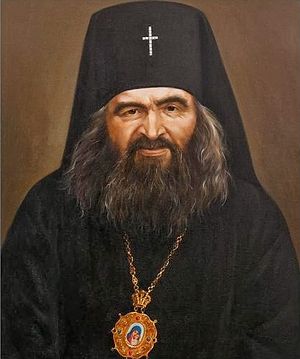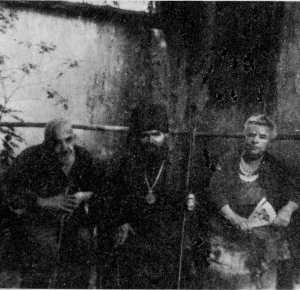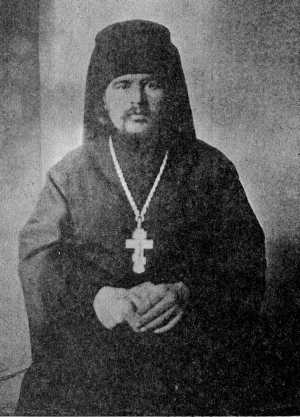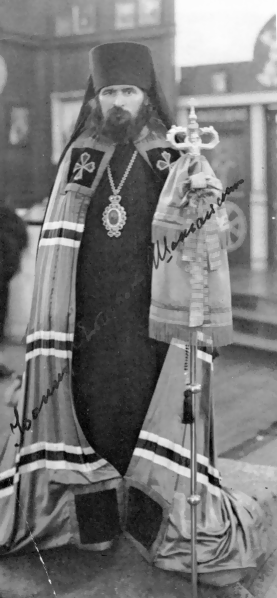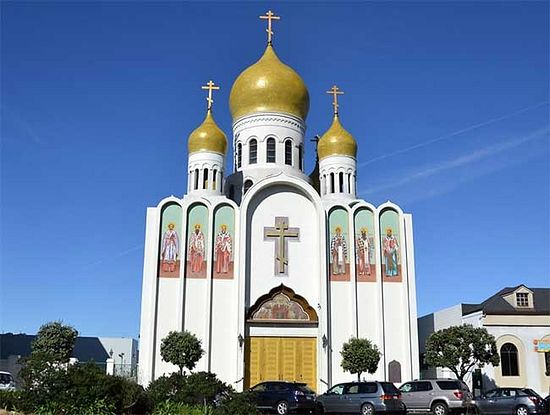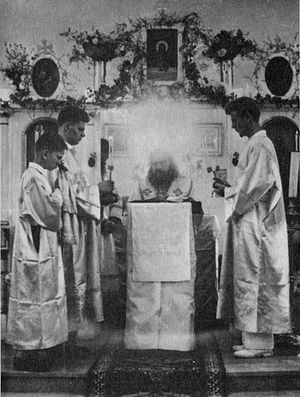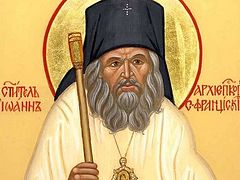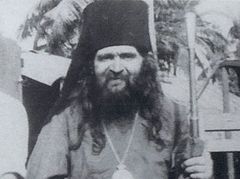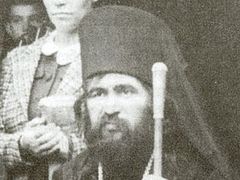St. John (Maximovitch) of Shanghai and San Francisco said these words in appearing already after his death to one woman. But he came to many people, and he was always overflowing with life, quenching the thirst of many. Today it is especially appropriate to remember that St. John of Shanghai and San Francisco, the wonderworker, is our contemporary, having reposed only a little over half a century ago, in 1966—that is, quite recently. It is another clear witness to the unity of the Russian Orthodox world, inasmuch as St. John embraces and links Slobozhanschina (Sloboda, Ukraine, an historical region in modern-day northeast Ukraine and southwestern Chernozemie in Russia—ed.), Ukraine, China, Western Europe, and America by his life.
The Russian Orthodox Church Abroad glorified this wondrous God-pleaser among the saints on July 2, 1994. On June 24, 2008, St. John of Shanghai and San Francisco was glorified for Churchwide veneration by the Council of Bishops of the Russian Orthodox Church.
In Poltava, on July 2 of the same year, the first festive, conciliar Liturgy in honor of the newly-proclaimed saint was served. Touching were the words of the prayers that rang out dedicated to St. John, who had studied in Poltava and prayed in the local churches.
***
Archbishop John (Michael Borisovich Maximovitch) was born on June 4/17, 1896 in the village of Adamovka, Kharkiv Governorate, in an aristocratic Orthodox family who materially supported the Dormition Svyatogorsk Monastery on the Donets River.
The future hierarch’s father Boris Ivanovich Maximovitch (1871-1954) was a leader of the gentry in the Izumsky District of the Kharkov Governorate. After the revolution, Michael Maximovitch’s parents emigrated first to Belgrade, then to Venezuela. The hierarch’s brothers also lived in emigration; one received a higher technical education and worked as an engineer in Yugoslavia, and the other, after graduating with a law degree from the Belgrade University, worked in the Yugoslav police.
From his childhood, Michael was distinguished by a deep religiosity, standing long nights in prayer, zealously gathering icons and ecclesiastical books. Above all, he loved to read the lives of the saints. The child’s holy and righteous life left a deep impression on his French Catholic governess, and as a result, she converted to Orthodoxy.
After finishing the Petrovsky Poltava Cadet Corps in 1914, the young man wanted to study at the Kiev Theological Academy, but at his parents’ insistence he entered the law department of Kharkov University, which he finished in 1918. Michael’s spiritual guide in these years was the renowned Kharkov archbishop Anthony (Khrapovitsky).
At the time of the revolutionary persecutions, the Maximovitch family emigrated to Belgrade, where the future hierarch entered the university’s theology department. In 1926, Michael was tonsured a monk by Metropolitan Anthony (Khrapovitsky), the head of the Russian Church Abroad, with the name John, in honor of his ancestor St. John of Tobolsk, a metropolitan and famous Church figure in the eighteenth century, and in 1929, he was elevated to the rank of hieromonk.
Already at this time, Bp. Nikolai (Velimirovic), the Serbian Chrysostom, characterized the young hieromonk thus: “If you want to see a living saint, go to Bitol to Fr. John.”
Fr. John fasted strictly, served the Divine Liturgy and communed daily, and never laid down from the day of his monastic tonsure, sometimes being found in the morning asleep on the floor before his icons. His meekness and humility were reminiscent of that which is immortalized in the lives of the greatest ascetics and hermits. Fr. John was a rare man of prayer; he was quite immersed in prayer, conversing only with the Lord, the Most Holy Theotokos, and the angels and saints, who stood before his spiritual eyes. The Gospel events were known to him as if they had occurred before his eyes.
In 1934, Hieromonk John was elevated to the rank of bishop, then left for the place of his future service, Shanghai. Metropolitan Anthony (Khrapovitsky) said of him, “This young and weak man, nearly a child in appearance, is a miracle of ascetic resilience and strictness, and a mirror of ascetic firmness and strictness in our time of general spiritual complacency.”
In Shanghai, the young Vladkya loved to visit the sick, which he did daily, hearing their confessions and communing them. If some patient’s situation became critical, Vlaydka would come at any time of day or night and pray for a long time at the sick’s bedside. There are many cases of healings of terminally ill patients by the prayers of St. John.
With the advent of the communists to power in China, the Russian emigrants were forced to flee. A camp was organized on the island of Tubabao (Philippines) for Russian exiles, in which Vladyka John lived with his flock. In 1949, about 5,000 Russians lived in a temporary camp on Tubabao, fleeing from China. This island is sparsely populated, as it is in the path of seasonal typhoons, however, during the camp’s twenty-seven month existence, it was threatened by typhoon only once, but then it changed course and went around the island. When one Russian mentioned his fear of the typhoon in conversation with some Filipinos, they said there’s no reason to be anxious, because “your saint blesses your camp every night from all four sides.”
Nourishing and supporting his destitute flock, St. John fervently prayed for them. He managed to negotiate with the U.S. authorities on the relocation of the Russian exiles to America. Then American law was amended, and the large part of the emigrants relocated to the U.S.A., and the rest left for Australia.
In 1951, Archbishop John was appointed the ruling hierarch of the Western Europe Exarchate of the Russian Church Abroad. In Europe, as in San Francisco, where Vladyka moved in 1962, his fame spread also among the heterodox population. In one Parisian Catholic church, the priest tried to inspire the youth with the following words: “You demand proofs, you say that there are no miracles or saints now. Why should I give you theoretical proofs when St. John the Barefoot (Saint Jean Pieds-Nus) walks the streets of Paris today?”
Blessed John received such a name because he always walked barefoot—even on the hard gravel of Versailles Park. After a serious blood infection from a glass cut, Vladyka was ordered to wear shoes. He wore them—under his armpits, until he was again ordered to wear shoes.
Archbishop John often served in church barefoot, which bewildered the other priests. However, every one of his actions had a deep significance and was born out of a living sense of the presence of God. Whereas the prophet Moses heard from the Lord, Put off thy shoes from off thy feet, for the place whereon thou standest is holy ground (Ex. 3:5), Blessed John showed by his barefootedness that now the whole earth is consecrated by the footsteps of Christ, and that we stand before the Living God in every place.
Vladyka was known and highly revered throughout the world. In Paris, the railroad station dispatcher would delay the train’s departure until the arrival of “the Russian archbishop.” In every European hospital, they knew about the bishop who could pray all night for the dying. He was called to the bed of all who were seriously ill, whether Catholic, Protestant, Orthodox or something else, because when he prayed, God was merciful.
This is what Mrs. L. Lew says, for example: “My husband was in a car accident in San Francisco; he was seriously hurt and suffering terribly. Knowing the power of Vladyka’s prayers, I thought, “If I invited him here, then my husband would recover.” Two days passed, and suddenly Vladyka showed up—he spent all of five minutes with us. Then came the most difficult moment in my husband’s suffering, and after this visit he made a sharp turnaround, and soon he had completely healed. Later I met Mr. T., and he told me about one time when he was driving Vladyka to the airport. Suddenly Vladyka said to him, ‘Let’s go now to see L.’ He objected that they would be late for the plane and that at that moment he could not turn around. Then Vladyka said, ‘Can you take a man’s life upon yourself?’”
And another story: The handmaiden of God Alexandra was lying sick in a Paris hospital. They told Vladyka about her. He gave them a note that he would come and give her Holy Communion. Lying in a common room, where there were about 40-50 people, this woman felt awkward in front of the French women because an Orthodox bishop, dressed in incredibly shabby clothes, and even barefoot, was going to visit her. When he gave her the Holy Gifts, her neighbor in the room, a Frenchwoman, said to her, “How happy you are, that you have such a spiritual father. My sister lives in Versailles, and when her children get sick, she sends them to the streets where Bp. John usually walks, and asks him to bless them. After getting his blessing, the children immediately get better. We call him a saint.”
Once, when Archbishop John happened to be in Marseille, he decided to serve a Pannikhida on the site of the brutal 1934 murder of the Serbian king Alexander I Karageorgievic, the patron of the Russian emigration. None of his clergy wanted to serve with him, out of false shame. Vladyka went alone. The residents of Marseilles were amazed to see a clergyman in unusual clothes, with long hair and a beard, strolling about the streets with a suitcase and broom. Press photographers noticed him and immediately started to snap his picture. Meanwhile, Vladyka stopped, cleaned a small part of the sidewalk with the broom, opened his suitcase, laid an episcopal eagle rug on the swept-up spot, lit the censer, and began to serve the Pannikhida.
***
There are many testimonies about the strict fulfillment of the Church’s regulations by the saint. There is much that is instructive for us in these famous “decrees” of Vladyka. They breathe grace and rigor, united in Vladyka’s wisdom. Vladyka John’s Orthodoxy was uncompromising; despite his mercy to all without exception, he particularly strongly opposed ecumenism.
Also memorable was his disciplining of women who venerated sacred objects with painted lips.
He even forbade the “poor and hapless babushkas” to give out the Paschal eggs before the end of the Paschal service, even to those praying with extreme weakness and infirmities. Here is the saint’s decree on this matter: “The most important thing on the bright day of Pascha is our communion with the Resurrected Christ, which is especially manifested in Communion in the bright service, about which we repeatedly offer supplications in the services of Great Lent. Leaving Pascha before the end of the Liturgy is a sin, or a misunderstanding of the Church service. If you have some compelling necessity to do so, the egg, being but a symbol of the Resurrection, cannot replace the actual partaking of the Resurrection in the Divine Liturgy, and the distribution of eggs before Liturgy would be contempt for the Divine Sacrament and a deception for the unbelievers… I call all to have a close participation in the Divine feast of the Resurrected Christ—the Holy Liturgy, and at the end of it to proclaim His Resurrection and to greet one another with the symbol of the Resurrection.”
Despite Vladyka’s usual strictness children, were completely dedicated to him. There are many touching stories about how the blessed one inexplicably knew where there might be a sick child, and would go to comfort and heal him. Receiving a revelation from God, he saved many from imminent trouble, and sometimes appeared to those to whom it was especially necessary, although such travel seemed physically impossible.
Now, in our time of the information age, the Orthodox world has become actively prone to deformations from outside. In particular, the joking and playful Western cult-celebrations have become pervasive. What’s important for us here is St. John’s attitude to this, having lived in the midst of the Western world, championing Orthodox piety and not allowing any deviation even due to weakness or, as the youth now say, “for fun.”
When Vladyka learned that some of his parishioners were going to a Halloween ball on the eve of the commemoration of the righteous St. John of Kronstadt, he went to the ball, silently walked around the hall, surveying the participants to their amazement and shame, and then silently left. The next morning, he issued a decree “On the impermissibility of participating in entertainments on the eve of Sundays and festal services,” which said, “The sacred rules tell us that Christians spend the eves of festal days in prayer and adoration, preparing for participation in or attending the Divine Liturgy. If all Orthodox Christians are called to this, then all the more does it apply to directly participating in Church services. Participation in entertainment on the eve of feasts is especially sinful. In view of this, those who go to a ball or similar entertainment and amusements on the Saturday evening or the eve of feasts cannot participate in the choir, serve in or enter the altar, or stand on the kliros the next day.”
The blessed Vladyka commemorated Patriarch Alexey I of Moscow at the Divine services, alongside the First Hierarch of the Russian Church Abroad, saying that “we are divided due to circumstances, but liturgically we are one. The Russian Church, like the entire Orthodox Church, is united eucharistically, and we are with them and in them. But administratively, we must, for the sake of our flock and for the sake of our well-known principles, walk this path—but it in no way destroys our sacramental union with the entire Church.”
***
Turning to history, and seeing the light of the future, St. John said that the heavy sufferings of the Russian people are a consequence of the betrayal of their path, of their calling. But, he believed that the Fatherland was not destroyed, but would rise just as it rose before. It will rise up when faith will be enkindled in the Russian land, when people are spiritually reborn, when their path again becomes clear, as well as their faith in the truth of the Savior’s words: But seek ye first the kingdom of God, and his righteousness; and all these things shall be added unto you (Mt. 6:33). It will resurrect when they love the confession of Orthodoxy, when they see and love the Orthodox righteous ones and confessors.
The saint spoke about this in his homily-lecture, “The Sin of Regicide.” His holy words are still relevant for us now:
The crime against Tsar Nicholas II is yet more terrible and sinful in that his whole family was killed together with him, including the children, who were guilty of nothing! Such crimes do not go unpunished. They cry out to Heaven and bring God’s wrath down upon Earth.
If the foreigner—the supposed murderer of Saul—underwent death, then the whole of the Russian people is suffering now for the murder of the defenseless Tsar-Sufferer and His family, having allowed such a terrible atrocity, and, remaining silent, when the Tsar was subjected to humiliation and deprived of his freedom. God’s righteousness demands from us a deep awareness of the sinfulness of this deed, and repentance before the memory of the Tsar-Martyr.
The memory of the innocent princes Sts. Boris and Gleb aroused the conscience of the Russian people during particular troubles and shamed the princes who had initiated the strife. The blood of the holy Great Prince Igor brought about a spiritual revolution in the souls of the people of Kiev and united Kiev and Chernigov by the veneration of the slain holy prince.
By his blood, St. Andrei Bogoliubsky sanctified the monarchy of Rus’, firmly established only much later after his martyric death.
The veneration of St. Michael of Tver throughout Russia healed the wounds on the body of Russia caused by the struggle between Moscow and Tver.
The glorification of the holy Tsarevich Dimitry cleared the conscience of the Russian people, breathing moral strength into them, and after such serious upheaval, led to the resurrection of Russia.
Tsar-Martyr Nicholas II and his much-suffering family have entered now into the assembly of these passion-bearers. This greatest of crimes committed against Him must be atoned for by fervent honor for Him and the glorification of His spiritual feat.
Rus’ must bow down before its humiliated, slandered, and martyred tsar, as once those of Kiev bowed before the holy Prince Igor martyred by them, and those of Vladimir and Suzdal before the slain Great Prince Andrei Bogoliubsky!
Then the Tsar-Passion-Bearer will acquire boldness before God, and his prayers will save the Russian land from the calamities it is enduring. Then the Tsar- Martyr and his co-sufferers will become new Heavenly protectors for Holy Rus’. The innocently shed blood will resurrect Russia and make it radiant with new glory!
***
Vladyka John foresaw his death. June 19 (July 2 new style), 1966, on the day of the apostle Jude, during an archpastoral visit to Seattle with the wonderworking Kursk Root Mother of God Icon, the protectress of the Russian diaspora, this great righteous one departed to the Lord.
After Vladyka’s death, one Dutch Orthodox priest wrote with broken heart, “I no longer have and will not have a greater spiritual father, who would call me at midnight from another continent and say, ‘Go to sleep now. You will receive what you are praying about’.”
The four-day vigil over Vladyka’s body was crowned with the funeral service. The bishops conducting the service could not hold back their tears. Strikingly, the church was filled with a quiet joy during the service. Witnesses noted that it seemed they were not present at a funeral, but at the opening of the relics of a newfound saint.
The saint was buried in the crypt of the cathedral in honor of the Joy of All Who Sorrow Icon of the Mother of God in San Francisco. Miracles of healing and help in earthly affairs soon began to take place in Vladyka’s sepulcher.
Thousands throughout the world venerate Vladyka John as a great and righteous saint, turning to him with fervent prayers, beseeching his help and consolation in spiritual and physical afflictions.[1]
We believe that the memory of this great Kharkovian will also be recovered in the saint’s homeland.

